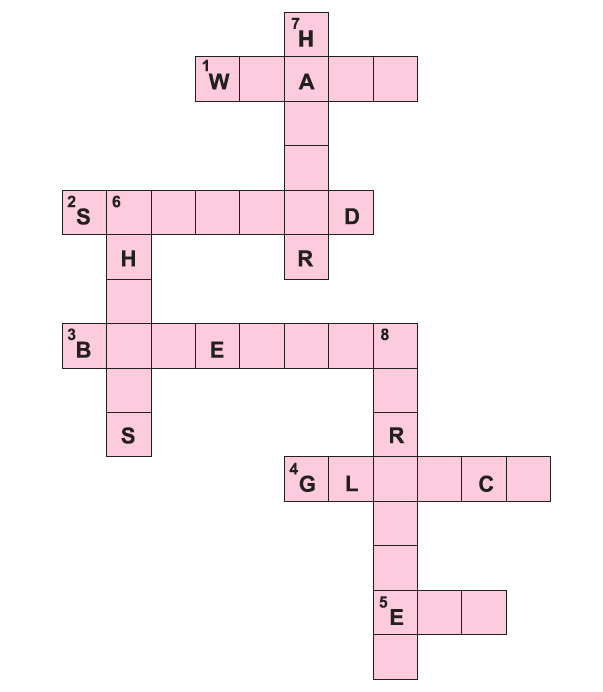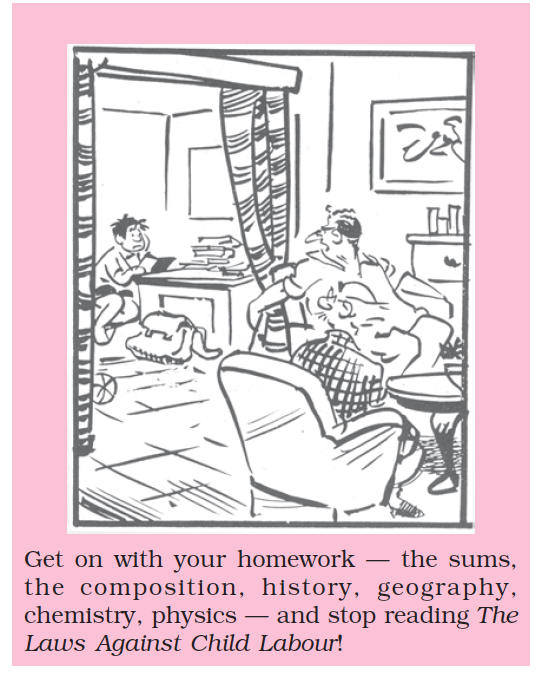Table of Contents
1
Before you read
Discuss in class: Do you like homework? Do you do it yourself, or do you get help? What homework do you usually have?
Who Did Patrick’s Homework?

1. Patrick never did homework. “Too boring,” he said. He played hockey and basketball and Nintendo instead. His teachers told him, “Patrick! Do your homework or you won’t learn a thing.” And it’s true, sometimes he did feel like an ignoramus. But what could he do? He hated homework.
2. Then one day he found his cat playing with a little doll and he grabbed it away. To his surprise it wasn’t a doll at all, but a man of the tiniest size. He had a little wool shirt with old-fashioned britches and a high tall hat much like a witch’s. He yelled, “Save me! Don’t give me back to that cat. I’ll grant you a wish, I promise you that.”
britches: breeches, or short trousers. The writer here spells it, for fun, to rhyme with the word ‘witch’s’.

3. Patrick couldn’t believe how lucky he was! Here was the answer to all of his problems. So he said, “Only if you do all my homework till the end of the semester, that’s 35 days. If you do a good enough job, I could even get A’s.”
4. The little man’s face wrinkled like a dishcloth thrown in the hamper. He kicked his legs and doubled his fists and he grimaced and scowled and pursed his lips, “Oh, am I cursed! But I’ll do it.”
dishcloth: a cloth used for washing dishes hamper: a basket with a lid
grimaced,scowled, pursed his lips: his face had these expressions, showing disgust, anger and disapproval
5. And true to his word, that little elf began to do Patrick’s homework. Except there was one glitch. The elf didn’t always know what to do and he needed help. “Help me! Help me!” he’d say. And Patrick would have to help — in whatever way.
“I don’t know this word,” the elf squeaked while reading Patrick’s homework. “Get me a dictionary. No, what’s even better, look up the word and sound it out by each letter.”
glitch (an informal word): a fault in a machine that prevents it from working properly; here, hitch or problem
6. When it came to maths, Patrick was out of luck. “What are times tables?” the elf shrieked. “We elves never need that. And addition and subtraction and division and fractions? Here, sit down beside me, you simply must guide me.” Elves know nothing of human history, to them it’s a mystery. So the little elf, already a shouter, just got louder. “Go to the library, I need books. More and more books. And you can help me read them too.”

nag: one who troubles someone all the time by complaining or asking them to do something
drag (an informal word): something dull and uninteresting
8. Finally, the last day of school arrived and the elf was free to go. As for homework, there was no more, so he quietly and slyly slipped out the back door.
slyly: secretively
9. Patrick got his A’s; his classmates were amazed; his teachers smiled and were full of praise. And his parents? They wondered what had happened to Patrick. He was now the model kid. Cleaned his room, did his chores, was cheerful, never rude, like he had developed a whole new attitude.
kid (an informal word): a child
chores: work that must be done everyday, often boring
attitude: a feeling about someone or something
10. You see, in the end, Patrick still thought he’d made that tiny man do all his homework. But I’ll share a secret, just between you and me. It wasn’t the elf; Patrick had done it himself!
Carol Moore
Working with the text
Answer the following questions. (Refer to that part of the text whose number is given against the question. This applies to the comprehension questions throughout the book.)
1. What did Patrick think his cat was playing with?
What was it really? (2)
2. Why did the little man grant Patrick a wish? (2)
3. What was Patrick’s wish? (3)
4. In what subjects did the little man need help, to do Patrick’s homework? (5,6)
5. How did Patrick help him? (7)
6. Who do you think did Patrick’s homework — the little man, or Patrick himself? Give reasons for your answer. (9, 10)
Working with Language
A. Fill in the blanks in the sentences below with the words or phrases from the box. (You may not know the meaning of all the words. Look such words up in a dictionary, or ask your teacher.)
out of luck mystery true to his word chores
semester between you and me look up
1. Some people find household ————————————— a bore, but I like to help at home.
2. Who stole the diamond is still a ————————————— .
3. This ————————————— we are going to have a class exhibition.
4. ————————————— , the elf began to help Patrick.
5. Can you ————————————— this word in the dictionary?
6. I started early to be on time, but I was ——————————— . There was a traffic jam!
7. She says she’s got a lot of books, but ————————————
I think most of them are borrowed.
B. Use the clues given below to complete this crossword puzzle.

Across
1. very tired
2. had an angry look on the face
3. short trousers
4. a fault in a machine that prevents it from working properly
5. a small and naughty boy-fairy
Down
6. work that must be done everyday, often boring
7. a basket with a lid
8. gave a short, high-pitched cry
Speaking
A. In the story Patrick does difficult things he hates to do, because the elf pretends he needs help. Have you ever done something difficult or frightening, by pretending about it in some way? Tell your classmates about it.
Or
Say what you feel about homework. (The words and phrases in the boxes may help you.) Do you think it is useful, even though you may not like it? Form pairs, and speak to each other.
For example:
You may say, “I am not fond of homework.”
Your partner may reply, “But my sister helps me with my lessons at home, and that gives a boost to my marks.”
(not) be fond of (not) take to (not) develop a liking for
(not) appeal to (not) be keen on (not) have a taste for
support assist with the aid of
help be a boon give a boost to
Writing
A. This story has a lot of rhyming words, as a poem does. Can you write out some parts of it like a poem, so that the rhymes come at the end of separate lines?
For example:
Patrick never did homework. “Too boring,” he said.
He played baseball and hockey and Nintendo instead.
B. Look at these sentences.
1. “Too boring,” he said.
2. Cleaned his room, did his chores.
When we speak, we often leave out words that can easily be guessed. We do not do this when we write, unless we are trying to write as we speak (as in the story).
So, if we were to write carefully, we would say:
• “Homework is too boring,” he said.
• He cleaned his room and did his chores.
C. Rewrite the following incomplete sentences carefully, so that the reader does not have to guess what is left out.
1. more and more books
2. too difficult
3. got up late, missed the bus
4. solved the mystery
D. Look at this cartoon by R.K.Laxman. Read the sentence given below the cartoon. Discuss the following questions with your partner.
• What is it about?
• Do you find it funny? If so, why?
• Do you think a cartoon is a serious drawing? Why or why not?

A House, A Home
What is a house?
It’s brick and stone
and wood that’s hard.
Some window glass
and perhaps a yard.
It’s eaves and chimneys
and tile floors
and stucco and roof
and lots of doors.
What is a home?
It’s loving and family
and doing for others.
It’s brothers and sisters
and fathers and mothers.
It’s unselfish acts
and kindly sharing
and showing your loved ones
you’re always caring.
Lorraine M. Halli
Working with the Poem
1. Do you agree with what the poet says? Talk to your partner and complete these sentences.
(i) A house is made of —————————————————––——— .
(ii) It has ————————————————————————————— .
(iii) A home is made by —————————————————––——— .
(iv) It has —————————————––——————————————— .
2. Now complete these sentences about your house and home.
(i) My house is —————————————————––———————
—————————————————––—————————————— .
(ii) The best thing about my home is ————————————––——
—————————————————––—————————————— .
Lengthy Process
“So, your son is still going to college,” a man remarked to another. “What is he going to be when he finally graduates?”
Replied the second: “Old”.
